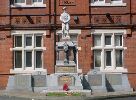
Newton-le-Willows and
Earlestown War Memorial

| OTHER WARS |
 |
Newton-le-Willows andEarlestown War Memorial |
 |
| The
Great War Roll of Honour |
|||||||||||||||||||||||||
Peter Tucker compares these two giants of the comic postcard scene
(Originally published in Picture Postcard Annual 1996)
(Reproduced by kind permission.)
"Eat slowly" was one of the ridiculous slogans offered from the new ministry of food created by Lloyd George in December 1916 in response to rising prices and shortages. German U-boats were taking their toll with the sinking of hundreds of tonnes of merchant shipping. The food controller, Lord Devonport, issued a voluntary rationing scheme of four pounds of bread, two and a half pounds of meat and three quarters of a pound of sugar each week. This meant little to most working men, who rarely had enough to eat normally, and it did little to stop injustices, for the wealthy still seemed to have plenty. All through 1917, people queueing became a common sight whatever the weather. In 'End of a perfect day!" on 'Witty'series no.611, Tempest draws a battered, tired and torn lady with a black eye sitting propped up against a stone wall clutching two packages, one of best dairy butter, the other of margarine. The sender writes: "My dear Hilda, Just a card hoping you are well and kicking after these exciting times. Is this how you come home after queueing for margarine, not quite so bad I don't expect; will write letter later...".
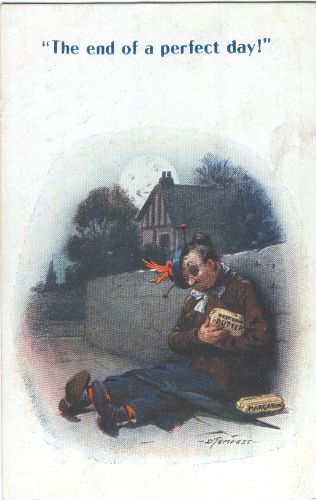 |
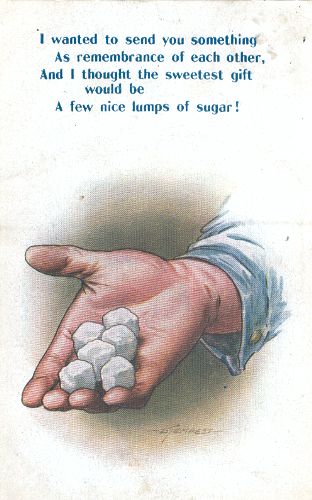 |
Although food supplies improved in 1917, distribution was bad, there were
still long queues and amongst the poor there were signs of malnutrition. The
government decided to introduce rationing proper in 1918. Donald McGi11 makes
up a little poem on 'Comique' series no.2389:
"Now everything you eat today
Is government controlled
And before you get your ration
Your name must be enrolled
But though controlled in food and drink
I swear by stars above
They cannot or will not control
The sloppy thing called Love."
First to be rationed was sugar, two thirds of which had come from Germany
before the war. In April, ration cards for meat, butter and margarine were
introduced. Individuals had to register with a local butcher or grocer. Little
girl to grocer: "Can't let us have no matches ? Alright, we shall get
our sugar somewhere else!" on 'Comique' series no.2297. This card represents
McGill at his best, very well drawn with lovely detail. The sugar shortage
must have been foremost on their minds because both artists made several designs
on the subject. In 'Comique' series no 2393, a soldier is guarding a sugar
lump protected inside a specially designed glass case in a museum of British
antiquities. 'Comique' series no.2308 portrays a portly lady in evening dress
wearing a tiara, earrings and necklace studded with sugar cubes: "I hope
the sugar controller will not be at the ball!" Tempest takes a different
approach on 'Witty Comics'series no.565 with a beautifully drawn hand offering
six sugar cubes. In 'Witty' series no.621 he produces a surreal image of a
smartly dressed lady in fur stole with a sugar lump head. Caption: "It's
the girls so sweet that used the cause Much fuss in days that were But it's
the lump of sugar nowadays That's causing all the stir!"
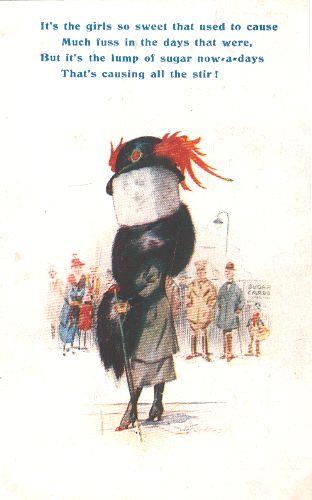 |
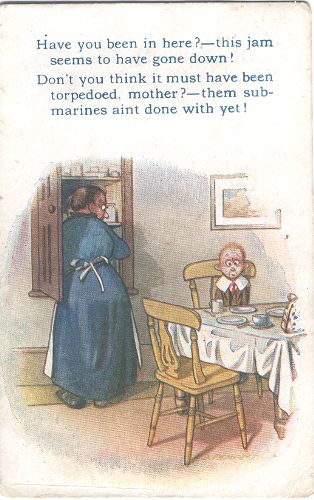 |
The sugar shortage causedjam also to be in short supply.Tempest returns to
torpedoes again. Mother looking into store cupboard to small boy who is trying
to look innocent: "Have you been in here? This jam seems to have gone
down!" Boy: "Don't you think it must have been torpedoed, Mother?
them submarines ain't done with yet!" This was on 'Witty Comic' series
no. 697.
Ration cards were successful and distribution improved immediately: queues
disappeared and prime joints reappeared in butchers' shops in the East End,
and in July they began to be replaced by coupon books. Throughout this period
only cheese, bread and tea remained unrestricted.
See also "Food
and Rationing"